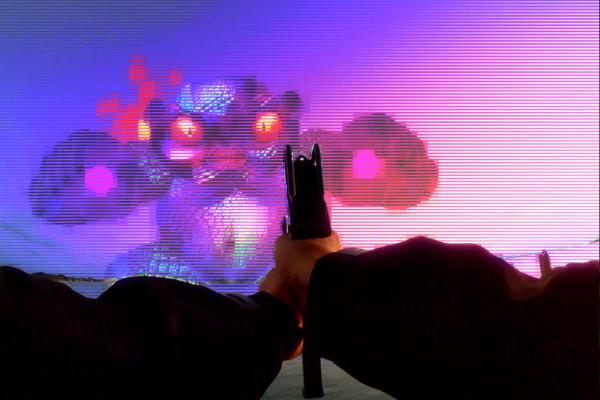ON THIS PAGE:
- Baby Invasion
- Beauty is not a Sin
- Why War
Baby Invasion
Oops! Harmony Korine did it again. What? He’s coming to Venice to leave the Film Festival audience speechless. Last year, the mission was accomplished thanks to the brilliant experiment of Aggro Dr1ft, infrared ultraviolence, which instantly became a cult. It was not the first time. Korine had been a frequent visitor to the Venice Festival for a long time. Here he brought Gummo, his debut film, in 1997, and two years later, it was the turn of Julien Donkey-Boy (the scene of Werner Herzog drinking champagne from a slipper is a cult). After a long absence, he returned in 2012 to create scandal with Spring Breakers, the sexy robbers in bikinis and balaclavas. Now, it is the turn of Baby Invasion, another experiment that explores the world of FPS (First Person Shooting) video games. Baby Invasion is a highly realistic video game in this category that follows a group of mercenaries who use baby faces as digital masks to hide their identities. Their mission is simple: raid luxurious mansions owned by rich and powerful people and exterminate everyone they meet in a race against time. A mad race with evidently political overtones, as the 51-year-old director from Bolinas, California, likes it. The music of Burial, the British genius of electronic music, counterpoints the whole movie.
Alessandro De Simone

Beauty is not a Sin
by NICOLAS WINDING REFN
with Laura Grassi, Stefano Gaeta / Italy, Denmark / 7’
Corinth Hall
‘Who says a film can’t last seven minutes?’. This is how the Danish director wanted to comment on his film starring a young woman who, during confession, admits her weakness in resisting temptation: after the story, the priest has a revelation and takes part in her supreme sin. Shot between Italy and Denmark, in Refn’s inimitable style, the short accompanies the viewer on a journey searching for beauty. In addition to the short film, the restored version of the filmmaker’s first film, Pusher – The Beginning, from 1996, which was followed by two other sequels starring his compatriot, Mads Mikkelsen, will also be shown in the Venezia Classici section. International fame then arrived thanks to his artistic partnership with Ryan Gosling, who starred in Drive in 2011 and Only God Forgives in 2013.
Tiziana Leone

Why War
«Man has within himself the pleasure of hating and destroying». That’s what Albert Einstein (1879 – 1955) wrote to Sigmund Freud (1856 – 1939) in an exchange of letters to which the two great intellectuals of the last century were invited, in the early 1930s, by the League of Nations to reflect and discuss on the reasons for the war. Israeli director Amos Gitai (Laila in Haifa, 2020) also chose to walk the same path taken by the two fathers of modern science in making his Why war, presented out of competition at the 81st Venice International Film Festival. Long undecided whether to place the work among fiction or non-fiction, artistic director Alberto Barbera described the feature film like this: «It is a film that consciously mixes the two languages, but what really matters in Why war is the question that the director asks himself starting from the exchange of letters between Albert Einstein and Sigmund Freud; a question that is more relevant today than ever in the face of the insane multiplication of conflicts in every part of the world. Which tells us how important and necessary the movie is». Precisely with his previous work, Shikun (2024), almost an artistic installation that represents all the sense of confusion and madness in front of the Israeli-Palestinian conflict, Gitai, always critical with his own government, had opened the way to one of the most harrowing questions for humankind, which he now tries to explore with this film. «There is nothing to win, except death», said the director in an interview. In this sense, Why war, interpreted by film and theatre artists for whom Gitai has great esteem – such as Irène Jacob, Mathieu Amalric, Micha Lescot, Jerome Kircher, Yael Abecassis – is able to actualize the thought expressed by Einstein and Freud a century ago.
Vania Amitrano


